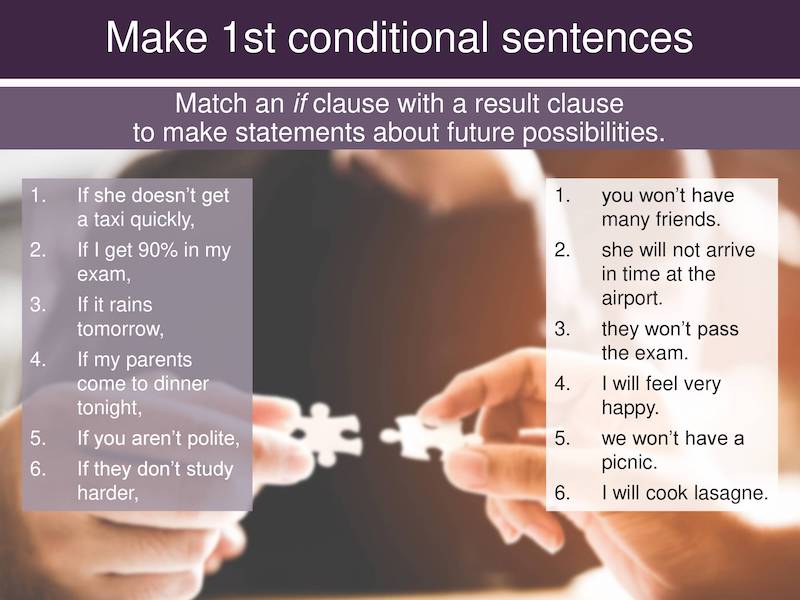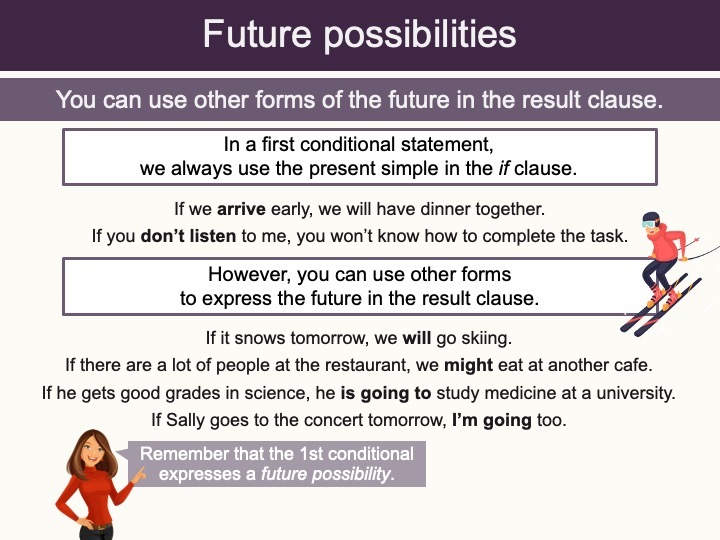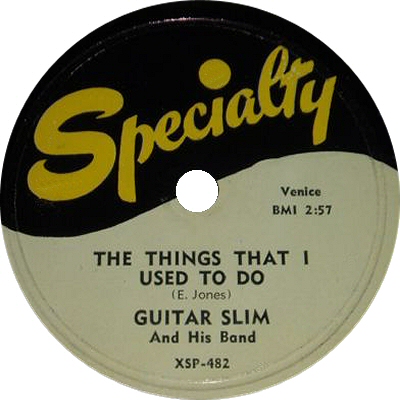5 min read
Share this post

In this post we’ll talk about when and how to teach the first conditional to ESL students — a tricky tense for both teachers and students. Here’s Sandra to introduce some first conditional lessons in our latest content release for the Step-by-Step Curriculum:
.
.
.
.
I’ll never forget my first encounter with conditionals because a lack of knowledge almost cost me my first teaching job.
The ink was barely dry on my TEFL certificate and my understanding of grammar was still shaky. I was in a Skype interview for a teaching company when suddenly the interviewer asked me: How would you teach the first conditional?
My mind was blank. I had no idea what the first conditional even was.
Panicked, I tried to stall answering the question and maintain my gaze at the camera. Meanwhile, I frantically Googled “English first conditional.” Thankfully I found something that triggered my memory and I was able to answer the question somewhat intelligently (or at least enough to get the job).
After that I promised myself I’d never forget the first conditional ever again!
.

.
.
Before you consider the question of how to teach the first conditional, you have to first ask the question of when to start teaching it.
A lot of teachers make the mistake of starting the conditionals too late. Don’t be afraid of teaching the first conditional to your low intermediate students! Because the conditionals are so complex (especially once we start mixing them), it makes sense to introduce your students to the tenses early on so that they can start to look for the patterns. You can start with the basic forms of the first conditional now.
.

.
.
Most importantly, the goal is to keep it simple. Don’t plan on teaching anything more than the first conditional at this level. It might help to start with a basic discussion of what conditionals actually are: A way for us to connect two separate but related events. For example:
If it’s sunny tomorrow, I’ll go to the beach.
The result clause of “I’ll go to the beach”, is dependent on the condition clause of “if it’s sunny tomorrow.”
Stick to the first conditional, and don’t introduce too many auxiliaries in the result clause. Limit yourself to will, won’t, might, could, and going to (and their negative counterparts). This will allow the student to understand the concept of the first conditional without feeling overwhelmed.
.

.
.
The slides in this post and referenced by Sandra in the video come from the Step-by-Step curriculum of Off2Class, the ESL teacher toolkit. We have nearly 800 ready to teach lessons in our library, along with a student management platform and comprehensive placement test.
We know there’s a whole lot more to teaching the first conditional. However, we hope that this post presents a few things worth thinking about before you teach the grammar and language in these units.
Share this post



39 Comments
Extremely helpful. Thanks so much
You’re welcome, glad you enjoyed it!
Very helpful thank you so much! How would you try to elicit the first condition? I don’t want to give them the grammar structure straight away so how would you start?
All of the Off2Class lessons have warm ups and previews so the student can see it in action first!
This was great intro! Thank you
You’re welcome, and happy to help!
Very helpful. Thanks.
you’re very welcome!
You have presented this topic very well and your use of images has made it so easy to grasp the concept.
Thanks Lindsay!
Looks amazing! About to do a TEFL assignment and will definitely use your input, thank you!
You’re very welcome, Gaynor!
hi there
im currently busy with my TEFL assignment B
what are the anticipated problems when teaching ‘the first conditional’?
Conditionals are tough for 2 reasons: Number one, every conditional has 2 rules a student needs to memorize, one rule for the if-clause and another for the result clause. Number two, there are 4 different conditionals to choose from (not to mention mixed conditionals), so it’s a lot of rules for a lot of situations!
Excellent, Thank you Chris, I am also doing my TEFL assignment B and have a mental block!
Glad you enjoyed the resource!
Great examples. I too am working through my TEFL Certificate. Sometimes putting the First Conditional into question form can be a bit hard too.
Yes, that’s true. Good luck with your TEFL course!
At what level would you expand on the first conditional by pointing out the following. ..First conditional used for: promising, warning, predicting, negotiating, drawing a logical conclusion, conclusion and requesting eg: If you bring the salad, I will bring the dessert. (Negotiating). I think maybe it would be good to do it in a matching exersisee (which is how I saw it) in lessons to follow once the students have a good grasp on it…?
This was extremely helpful! Thanks so much
You’re welcome!
hi i found the material extremely helpful. i was facing a mental block and i am resubmitting my assignment B it was a first conditional lesson .
Great to hear. The first conditional can be tricky!
Haha, I see you’re doing a TEFL course with The TEFL Academy too!
Thank you! This is exactly what I’m teaching this week!
Glad this post was useful!
Thank you all for these comments are very helpful.
Thanks so much for stopping by!
Your materials are great,helped me a lot in last minute reviews,Looking forward to more.
Thanks
Thanks for the kind words, Patrick! You should have a peek at the downloads that we just released! https://www.off2class.com/lesson-plan-downloads/
how would you do a timeline for the first conditional?
First conditionals describe a future result based on a present or future action. Maybe something like this: (now)→→ if you read on the couch (present or near future)→ → you will fall asleep (farther in the future). Hope that helps.
Hi, thank you. This was very helpful as I was grappling with my assignment B, this sheds some light. Thank you.
Glad to hear it, Kingsley!
Very helpful. Thank you so much. Much clearer now.
So glad it helped!
GAZILLION OF THANKS, IT HELPED ME IN TEFL ASSIGNMENT
It’s a pleasure. We are so happy to hear.
Yes, it helped a lot. Thanks a bunch.